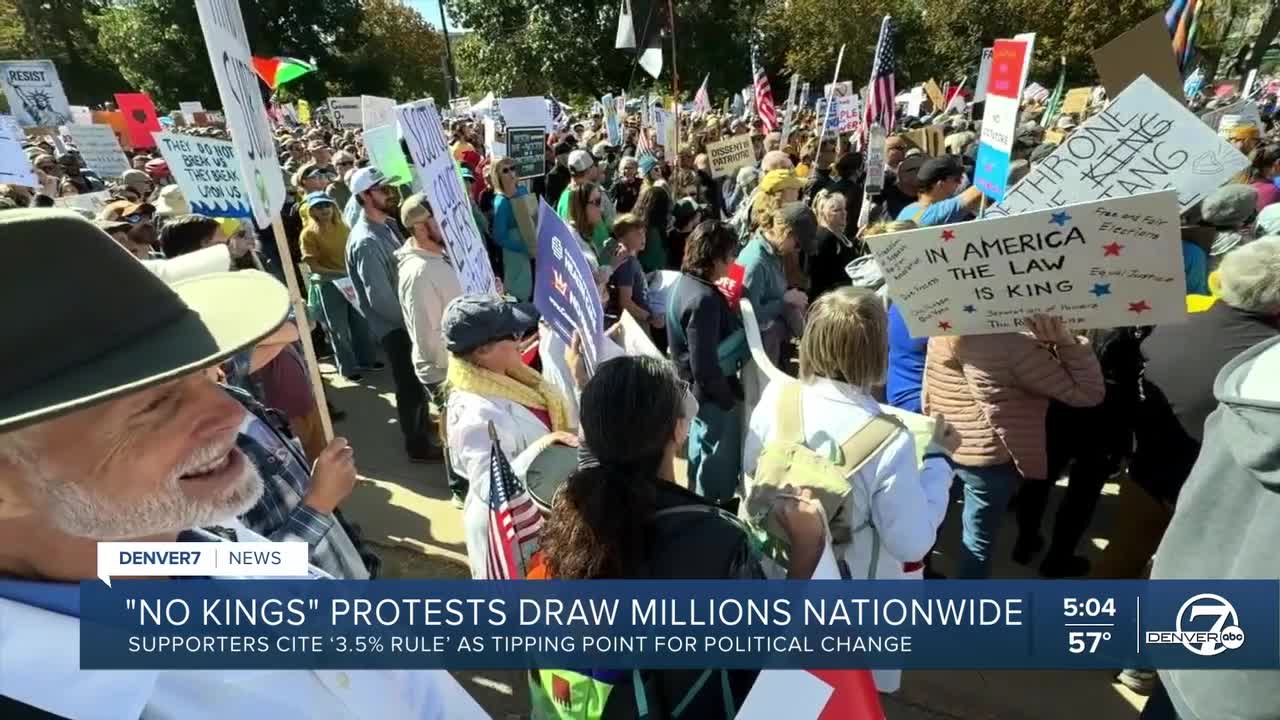DENVER — Thousands participated in No Kings protests across Colorado on Saturday, and many hope nationwide participation reached the 3.5% theoretical threshold, which they claim can foreshadow the end of many Trump administration policies.
The 3.5% rule is a political concept that emerged from a 2020 Harvard University study analyzing the correlation between peaceful protests and policy change.
Dr. Robert Preuhs of MSU Denver noted the rule’s origins in authoritarian contexts and cautioned that the U.S. doesn't fit that model.
“The study looked at protests against authoritarian regimes, and they found that when approximately 3.5% of the public actually participates in these protests, authoritarian regimes either make major changes in terms of public policy or fall,” Preuhs said. “The limit is that this is mostly research coming out of authoritarian regimes, and we're not quite there yet, but certainly many of the protesters feel a sense that we're headed that way, and that was the thrust of the protest.”
According to the most recent U.S. Census data, the United States has a population of about 345 million people, and 3.5% of that is about 12 million people.
No Kings organizers report 7 million protesters participated in demonstrations last weekend. But some supporters of the movement said that if the 5 million protesters from the June demonstrations are factored in, bringing the total to 12 million, the rule applies.
Preuhs said that, whether the rule applies or not, numbers matter overall.
“Elected officials look at numbers and think votes and think down the line of what their prospects are,” Preuhs said.

Politics
'No Kings' rallies sweep Colorado and nation in protest against Trump
Preuhs said that historically, for protests to translate into policy change, they need to be consistent, persistent, and sustain public interest.
“We have the workers' protests in Poland, which brought down the communist regime. We saw protest movements in parts of the Middle East in 2018, some of which were successful, others not. And then, of course, we have broader protest movements, both in Colorado and throughout the United States, such as the Civil Rights Movement in the 1960s. And that was a very long, sustained movement, which, you know, made considerable progress in terms of moving us into a more equitable society,” Preuhs said.
Preuhs said in terms of the No Kings demonstrations, it’s essential to watch what happens next.
“Are the protesters and the No Kings movement able to kind of rally the troops one more time, around the time where...there's a big policy movement or change from the Trump administration? And then also, (watch) how well they maintain their organization, because we're not really an authoritarian regime, the progress is probably going to be made in the 2026 elections, and see how well they can translate protests and being verbally and visually upset, and that image to the ballot box.”





Denver7 is committed to making a difference in our community by standing up for what's right, listening, lending a helping hand and following through on promises. See that work in action, in the videos above.





